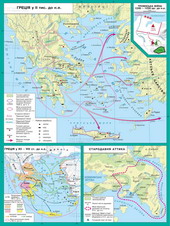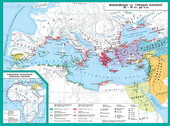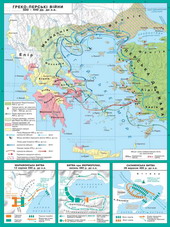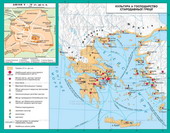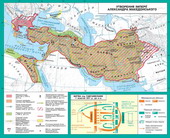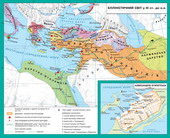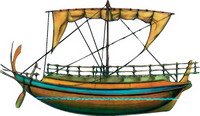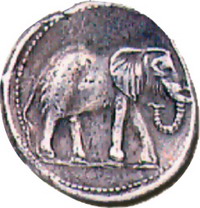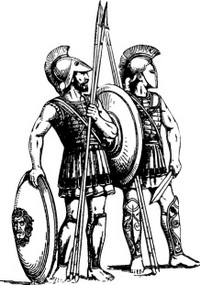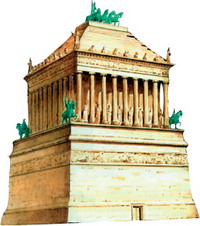§ 36. The heyday and decline of Athens
1. Classical Greece (on the border of VI - V century.BC to 338, the BC)
It wasperiod the highest rise of Greece, flowering policies.
Police – Civiliancommunity, which were full citizens of the land owners. Civilgave the right and title to land. Losing this right meant the loss andcivil rights. Those who had no civil rights, had no property rightson the ground. High land owner had a policy as a group of citizens. Highmanagement body in the policy have always been popular meeting that the solution of allimportant issues.
Citizenpolicy and was once a warrior, whose duty in defense policy and was part of ahimself. As a policy formed its own system of values. It was believed that the existenceperson outside the policy impossible, and its prosperity depends on well-beingpolicy.
In those dayspolicies are widely distributed in the slavery of classical type.
There were two main forms of slavery: ilotiya (Example is Sparta) and classical slavery (Attypical exampleAthens is). In classic bondage slave was deprived of property, fullybelonged to the owner, his name "talkinginstrument. slaveowners Right servant no limited. Children of slavesbecame slaves.
Slaves classical Greece were not natives. ItOther residents were captured during wars and pirate attacks. Therenevilnytski markets where product is sold live.
AlmostEach farm labor used slaves: in agriculture,in workmanship, construction and mines. It is often used slaveshousehold tasks for managers, cooks, nurses, nurse, teacher.(Teachers called slave overseers, who was a child and led her toschool.)
Inmostly wealthy citizen was in his house five - ten servants, somewealthy Athenian families held 50 slaves.
Pricesservants were low, which allowed people to even middle-incomebuy them. In the period distributionbondage slave-owners insurance policy provided domination over slaves.

Ancient Culture and EconomyGreece
2. Athenian democracy
In the middle of V century. BC Athensestablished full democracy.
Peoplefees were the main body of the Athenian state. They can participateAthenian citizens, age 20, regardless of propertycondition. The People's Assembly convened 4 times a month.
Been throughthey are in the urban area - agora, in V century. BC - On a slope Pniksu or in the theater. These fees determinedadvance. They elected officers, heard reports on implementationresponsibilities, consider financial issues, national security. Anyafinyanyn had the right to speak and express their opinion. The voting was secret,Athenians lowered into bins white or black stones. Only during electionsstrategic voting was open (raising hands).
A total ofAthens was about 30 thousand citizens took part in meetings of 5-6 thousandman who lived not far from Athens. Most votes in the National Assemblybelonged to ordinary people. The Athenian people alone to solve the major issues inThis was democracy.
Forissues in between meetings and to oversee the implementation of the decisionselected Council of five hundred. The council elected for one year. Meetingconducted each day. They considered all the issues which were passed on Peoplemeeting.
Greatsignificance for the state played a People's Court, which appeared in Saline inVI. BC It consists chose 6000 people. MemberPeople's Court could be anyone, even the poor. For work in courtAthenians get paid for it was a poor source of income. NationalCourt divided on commission from 200 to 500. The court sat every dayexcept holidays. Commission members did not know beforehand in which case the commission and that theywill be considered, it is allowed to prevent the bribing of judges.
Athenian democracy was limited. Onlypurebred Athenians, in which parents were natives, enjoyrights. Athenian women who made up half of the total population, not onlysupposed to control state and they were even forbidden to beattend the National Assembly.
3. Golden Era Athens. Perikl
Person
Perikl belongedto the noble and wealthy Athenian family. He was a talented and educatedman. Nobody could beat him in a conflict, because he stood out logicopinions in his personal life was modest and energy-saving. Completely devoted himselfstate activity, leaving a festive banquets and entertainment. Plutarchwrote Perikla: "For him there was onlyone way in - and that led to the building and piece of advice. He did not walkfor dinner and stopped all kinds of secular relations, yes, all that a longtime that he was involved in state affairs, he went for lunch to anywith their friends. "
Perikl protecting the interests ofcommon people, by the Athenians is 14 years (444-431 BC)choose its strategies. He could clearly identify key issues governing the State so that peoplealways supported his decision. Perikl providedevents and correctly assessed the situation.
Board Time Perikla,ie the middle of V century. BC, called the "golden age".It was the heyday of the Athenian state and the Athenian democracy. Perikl first introduced in Athens salaries for elective statepositions. This gave people an opportunity to calmly deal with state affairs, not thinkingof search of work. It was established fee for service in the army and navypensions to invalids, who were not able to earn a living. SonsAthenians who died in war, to refrain achievementmajority of public funds.
Since Perikla well-developed building, and that gave youmany poor people get jobs. Athens was invited to the bestarchitects and sculptors of Greece. It was built beautiful houses andchurches Long walls (6 km) tiedAthens of the harbor Piraeus.
GreatAthens played a role in the various holidays, accompanied freebie.Distributed to the poor to enable them to purchase tickets to the theaterperformances. Sometimes the citizens of Athens rozdavavsya free bread. In periodboard Periklato the Athens Sea Union consisted of 200 cities. Speeches alliesagainst the dominance of Athens prydushuvalysya force in their new lands were foundedcolony. Maritime Union of money that were going to war, spending forbeautification of Athens. For this the allies condemned Perikla.But he explained that the fact that Athens is not obliged to anybody accountable fortreasury of the union, because they ensure the security of allies.
Contemporarieswrote Perikla: "Although he did with the citybig greatest and richest, although its power exceededMany kings and tyrants, it is on any piece not increased their wealth againstthat left his father. "
Document
Oath of a citizen of Athens
I zhanblyu sacred arms, nor forsake a friend, which will go to fight,and protect and temples and shrines - and himself along with many. Motherland leavebehind not reduced, but greater and better than he inherited it. Iobey power, which always exists, and will follow establishedlaws, as well as those new to introduce people in agreement. And if someoneabolish laws or not pidkoryatymetsya them, I will not allow this and protectthem and himself with them. And I honor the parent of the sanctuary.
Inquiries to document
1. What are the main provisions of the oath the Athenians?
2. For what purpose was proclaimed oath?
3. What were the main responsibilities of the Athenians?
2. Peloponnesian War
Peloponnesianwar that lasted almost 30 years (431-404 BC)differed cruel battles and great losses for all involved.
EconomicGreece after the rise Greco-Persian The warto increased competition between the leading commercial and manufacturing policiesGreece - Athens, on the one hand, and Corinth and Meharamy- On the other. Their trade interests faced not only on the mainland, but alsothe markets of the north-eastern part of the Greek world (in Macedonia, Thrace,Black l) and in the Western Mediterranean `th (in Italy and Sicily). Soin this confrontation is important to provide control over the supportingtransit trade points towards these markets.
The secondreason become political circumstances. Athens trying to support anydemocratic regimes in the Greek policies, Sparta traditionally focused onoligarchs. That rivalry between Athens and Sparta was a key reason forbloody war.
The reasonfor solving the war were few conflicts.
1) Corinth,that was part of the Peloponnesian alliance, conflict broke out with hiscolony Corfu for a common colony Epidamna. Corfu soughtto secede and establish their control over Epidamnoyu,important transit point on the Adriatic coast (Illyria). Athens thisconflict support CorfuThat sharplysharpened the conflict of Corinth, which upheld antyafinskerevolt of the colonies Potydeyi against the Athenian panuvannnya First in Athens Sea Union.
2) Athensbanned Meharam trade harbors in Attica andits allies.
EventuallySparta at the insistence of his allies - and Corinth Mehar-resent requirements presented to Athens, and who do not. Armed conflicts hasinevitable.
In the war,that erupted between the two military-political alliance, the parties keptopposite strategies. Yes, Athens tried to use their advantage inSea, setting the Peloponnesian Union blockade and landing troops conducting raids indeep into the Peloponnesus (the Spartans by tradition is built around their citiesfortification). Sparta is, in turn, relied on his powerful land armiesand sought to destroy the Attica and Athens imposed jazaty general battle on land.
DuringPeloponnesian War are two stages:
1. Arhidamova War (431-421 BC)
2. Dekeleyska War (415-404 BC)

Peloponnesian War 431-404 yearsto century AD.
Warstarted fivantsiWho was attacked in April 431 BCon PlateyiThat belonged to the First AthensMaritime Union. In June 431 BC Spartans invaded Attica.But thanks to the long wall Athenians managed to defend the city. Next yearSpartans were again besieged Athens, but at this time rescued long wallcity, despite the fact that Athens suffered an epidemic disease, which claimed the lifeMany Athenians and their leader Perikla.

Spartan helmet
IntrusionSpartans in Attica caused a noticeable impact on the economy and the epidemicundermined the military power of Athens. Death Perikla aggravatedpolitical struggle between supporters of making peace and war continue toSparta. In sharp fight defeated supporters of the war led Kleonom. Athenians resorted to action. Their fleet andAllies established a blockade Peloponnesus, and Athenian army landed on the westerncoast of the peninsula, capturing the key point Pilos.Athenians supported the ancient enemies of Sparta messentsi.Sparta on the verge of defeat.
In suchdifficult conditions Spartan commander Brasidresorted to innovative solutions. He had the center of opposition to the NorthGreece (Peninsula Halkidiki), There by making warexpedition to wrest from its allies of Athens. In the battle of Amphipolis (October 422 BC) the Spartansdefeated the Athenians. But die in battle as captain of the Athenians Kleon,and the Spartans Brasid. Opposing forces were exhausted.In 421, the peace treaty was signed which provided for the returnparties to pre-war status.
But peaceactually became of my truce.
As early as 420, theBC Athens was led by nephew Perikla AlkiviadA proponent of war against Sparta. He supportedmutiny of some allies and Sparta stood for organizing military expeditions onSicily Syracuse to win, the main strong point of Greeks in the western Mediterranean.Spartans in 418, the BC managed to suppress the mutiny, expedition toSicily suffered a complete defeat. Himself Alkiviad not takenparticipation in the expedition, because at the beginning of the expedition was arrested,charged with religious crimes and sentenced to death. However, towardsAthens, he escaped to Sparta.
Thatrevenge Athenians, Spartans advised not just to make raids into Attica,a foothold there, paralizuvavshy farming region. In 413, the BCWhen the news of the defeat of the Athenians at Syracuse has reached Greece, the Spartansinvaded Attica, turning the city DekeleyuThat 20 km from Athens, onits base from which raids carried out on the outskirts of Athens. By thisthe second phase of the Peloponnesian War got its name - Dekeleyskyy.
In thissituation Athenians that were shut for long walls were, theirhostages. Fugitives from the whole of Attica have been nurtured, to provide training and resourcesAthens were exhaustible. In addition, fled from Athens 20 000 slaves,undermined in handicraft production and extraction of silver. To make Athenscapitulate Sparta needed a navy that had cut a path of deliveryAthens bread, wood, etc. ship.
HereSparta found an unexpected ally - Persia, which has provided funds forfinancing a large fleet. Sparta also won the right to collecttribute to the rich Greek policies of Asia Minor, who broke away from the FirstAthens Maritime Union. This successSparta also had to thank Alkiviadu.
Itled to the fact that Athens found themselves in a difficult position edge. Usingthis prospartansky set large landowners,that suffered huge losses from the war, made a coup and installed power400 notable oligarchs. The number of Athenian citizens was reduced to 5 tytsyach. However, their attempts to make peace with Sparta endedfailure. Army and Navy did not recognized the "400" and addressed to AlkiviadaThat he led them. Athens at the time found themselves indifficulty, Spartan fleet blocked the Black Sea straits, through whichwith Black supplied the necessary goods. Alkiviadagreed and are already in the first battle defeated the Spartan fleet and broke the blockade.Return Alkiviada to Athens was triumphant but notlong. After minor defeat in the naval battle of the Spartan fleet, hewas removed from command.
In 406 theBC near Arhinuzskyh nearby islands o.Lesbosa was a huge sea battle in which the Athenianswon a brilliant victory. But the victory turned out to last. The nextSpartan commander, the outstanding Lisandro smashdefeated the Athenian fleet, which stood in a small river Ehospotamy(Kozyna River ") Near the Thracian Chersonese.After this victory the Spartans executed 3000 prisoners Athenians (unheardAt that time, violent!).
Afterfollowing the defeat of Athens broke all allies, except Samos.Sparta again blocked all the ways of the sea trade of Athens. The Spartan Armyagain invaded Attica. Spartan fleet entered the harbor Pireya. To worsen the situation of Athens, Lisandroall Athenians who lived sometime in the cities became allies to send to Athens. This isworsened the food situation in the city. Finally, in April 404, theBC Athenians were forced to capitulate.
Spartavery difficult conditions dictated peace. Rozpuskavsya first Athenian Sea UnionAthens joined the Peloponnesian alliance. Deprived Athens fleet. Likvidovuvalysyastrengthening Pireya, Likvidovuvalysya long walls. Athenswere to receive all previously exiled oligarchs.
Inresulting in Athens forged oligarchic rule (rule Thirtytyrants), but not for long. In the battle of MunihiyiDemocrats defeated the army of tyrants, and restored democratic order. ButAthens already had former power.
Questions and Tasks
1. Whichsocial order existed in Athens during the reign Perikla?
A) tyranny and b) democracy.
2. Between whichAttica two cities were built "long wall?
3. What is the period inhistory of Athens were called "golden era "?
4. Which GreekStates fought during the Peloponnesian War?
5. Statewon the Peloponnesian War?
6. Afterend of the Peloponnesian War Athens was installed ...
A) oligarchy, b) tyranny in) democracy.
 English
English



